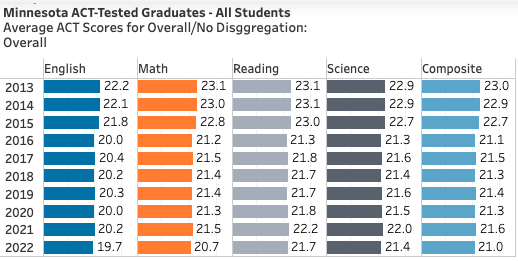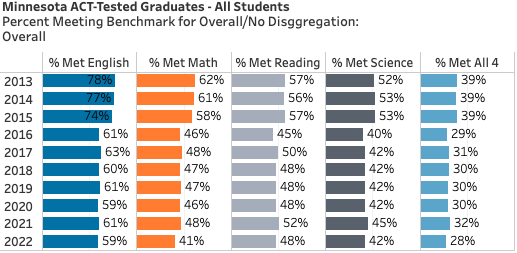Minnesota ACT scores drop to lowest levels in at least a decade

Average English, Math, and Composite American College Test (ACT) scores among Minnesota’s high school graduating class of 2022 are the lowest they have been in at least a decade, according to a report by ACT, the nonprofit organization that administers the college readiness exam.
For Minnesota, 69 percent of the state’s 2022 high school graduates took the exam, earning an average composite score of 21 out of 36 possible points — the lowest average since at least 2013 scores.

Only 28 percent of exam-takers met all four college-readiness benchmarks in math, reading, English, and science, also the lowest percentage in at least a decade. According to ACT, the college readiness benchmarks “demonstrate the minimum ACT scores required for students to have a higher probability of success in credit-bearing first-year college courses.”
Nationwide, ACT scores are the lowest they have been in more than 30 years. Those taking the exam averaged 19.8 out of a possible 36 points — the first time since 1991 that the average score was below 20.
While the graduating class of 2022 experienced learning disruptions across three years of their education (sophomore, junior and senior years), the declines in average ACT scores existed before COVID-19.
“This is the fifth consecutive year of declines in average scores, a worrisome trend that began long before the disruption of the COVID-19 pandemic, and has persisted,” said ACT CEO Janet Godwin in a press release.
The magnitude of the declines this year is particularly alarming, as we see rapidly growing numbers of seniors leaving high school without meeting the college-readiness benchmark in any of the subjects we measure. These declines are not simply a byproduct of the pandemic. They are further evidence of longtime systemic failures that were exacerbated by the pandemic. A return to the pre-pandemic status quo would be insufficient and a disservice to students and educators. These systemic failures require sustained collective action and support for the academic recovery of high school students as an urgent national priority and imperative.
Forty-two percent of students nationwide in the 2022 graduating class who took the ACT met none of the college readiness benchmarks in math, reading, English and science, an increase from 38 percent in 2021. Only 22 percent of students nationwide met all four benchmarks, a decrease from 25 percent in 2021.
Average nationwide SAT scores also saw a decline, with about 43 percent of test-takers meeting the exam’s college readiness benchmarks for reading, writing, and math, reported The Wall Street Journal.
This assessment data adds on to other ever-growing data on the educational harms students experienced from policy decisions that closed schools and disrupted learning environments. State leaders, policymakers, and school systems would do well to realize that such data should play a critical role in guiding future policy decisions.